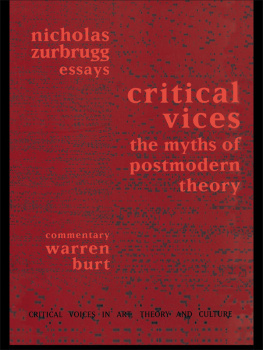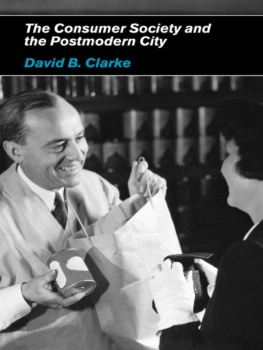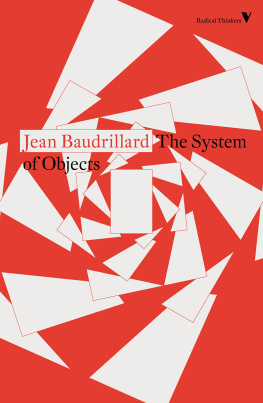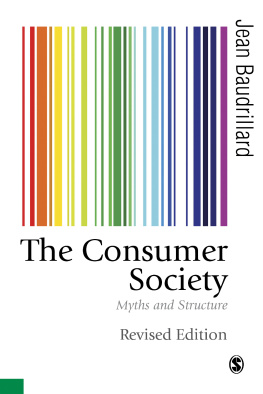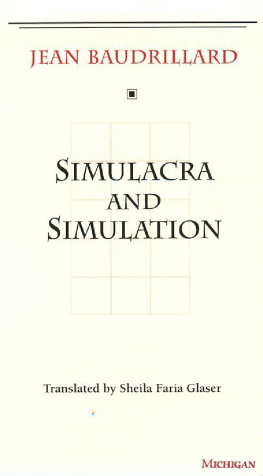Baudrillard - The consumer society: myths & structures
Here you can read online Baudrillard - The consumer society: myths & structures full text of the book (entire story) in english for free. Download pdf and epub, get meaning, cover and reviews about this ebook. City: London, year: 2014;1998, publisher: SAGE Publications, genre: Art. Description of the work, (preface) as well as reviews are available. Best literature library LitArk.com created for fans of good reading and offers a wide selection of genres:
Romance novel
Science fiction
Adventure
Detective
Science
History
Home and family
Prose
Art
Politics
Computer
Non-fiction
Religion
Business
Children
Humor
Choose a favorite category and find really read worthwhile books. Enjoy immersion in the world of imagination, feel the emotions of the characters or learn something new for yourself, make an fascinating discovery.

- Book:The consumer society: myths & structures
- Author:
- Publisher:SAGE Publications
- Genre:
- Year:2014;1998
- City:London
- Rating:4 / 5
- Favourites:Add to favourites
- Your mark:
- 80
- 1
- 2
- 3
- 4
- 5
The consumer society: myths & structures: summary, description and annotation
We offer to read an annotation, description, summary or preface (depends on what the author of the book "The consumer society: myths & structures" wrote himself). If you haven't found the necessary information about the book — write in the comments, we will try to find it.
The consumer society: myths & structures — read online for free the complete book (whole text) full work
Below is the text of the book, divided by pages. System saving the place of the last page read, allows you to conveniently read the book "The consumer society: myths & structures" online for free, without having to search again every time where you left off. Put a bookmark, and you can go to the page where you finished reading at any time.
Font size:
Interval:
Bookmark:
The Consumer Society
Theory, Culture & Society
Theory, Culture & Society caters for the resurgence of interest in culture within contemporary social science and the humanities. Building on the heritage of classical social theory, the book series examines ways in which this tradition has been reshaped by a new generation of theorists. It will also publish theoretically informed analyses of everyday life, popular culture, and new intellectual movements.
EDITOR: Mike Featherstone, Nottingham Trent University
SERIES EDITORIAL BOARD
Roy Boyne, University of Durham
Mike Hepworth, University of Aberdeen
Scott Lash, Lancaster University
Roland Robertson, University of Pittsburgh
Bryan S. Turner, Deakin University
THE TCS CENTRE
The Theory, Culture & Society book series, the journals Theory, Culture & Society and Body & Society, and related conference, seminar and postgraduate programmes operate from the TCS Centre at Nottingham Trent University. For further details of the TCS Centres activities please contact:
Centre Administrator
The TCS Centre, Room 175
Faculty of Humanities
Nottingham Trent University
Clifton Lane, Nottingham, NGll 8NS, UK e-mail:
Recent volumes include:
The Body and Society
Explorations in Social Theory
Second edition
Bryan S. Turner
The Social Construction of Nature
Klaus Eder
Deleuze and Guattari
An Introduction to the Politics of Desire
Philip Goodchild
Pierre Bourdieu and Cultural Theory
Critical Investigations
Bridget Fowler
Re-Forming the Body
Religion, Community and Modernity
Philip A. Mellor and Chris Shilling
The Shopping Experience
edited by Pasi Falk and Colin Campbell
Undoing Aesthetics
Wolfgang Welsch
Simmel on Culture: Selected Writings
edited by David Frisby and Mike Featherstone
The Consumer Society
Myths and Structures
Jean Baudrillard

English translation copyright Sage Publications 1998
Introduction George Ritzer 1998
Originally published as La socit de consommation Editions
Denoel 1970
This edition 1998, Reprinted 1999
This translation is published with financial support from the French Ministry of Culture
Published in association with Theory, Culture & Society, Nottingham Trent University
All rights reserved. No part of this publication may be reproduced, stored in a retrieval system, transmitted or utilized in any form or by any means, electronic, mechanical, photocopying, recording or otherwise, without permission in writing from the Publishers.
 | SAGE Publications Ltd 6 Bonhill Street London EC2A 4PU |
| SAGE Publications Inc. 2455 Teller Road Thousand Oaks, California 91320 | |
| SAGE Publications India Pvt Ltd 32, M-Block Market Greater Kailash - I New Delhi 110 048 |
British Library Cataloguing in Publication data
A catalogue record for this book is available from the British Library
ISBN 0 7619 5691 3
ISBN 0 7619 5692 I (pbk)
Library of Congress catalog card number 97061881
Typeset by Photoprint, Torquay, Devon
Printed in Great Britain by Redwood Books, Trowbridge, Wiltshire
Shower him with all earthly blessings, plunge him so deep into happiness that nothing is visible but the bubbles rising to the surface of his happiness, as if it were water; give him such economic prosperity that he will have nothing left to do but sleep, eat gingerbread, and worry about the continuance of world history.
Fyodor Dostoyevsky, Notes from Underground
George Ritzer
Jean Baudrillards book The Consumer Society is a masterful contribution to contemporary sociology. It certainly has its place in the tradition which includes Durkheims The Division of Labour in Society, Veblens Theory of the Leisure Class and David Riesmans The Lonely Crowd.
Baudrillard analyses our contemporary Western societies, including that of the United States. This analysis focuses on the phenomenon of the consumption of objects which he has already tackled in The System of Objects (Gallimard, 1968; translation, Verso, 1996). In his conclusion to that volume, he formulates the plan of the present work: It has to be made clear from the outset that consumption is an active form of relationship (not only to objects, but also to society and to the world), a mode of systematic activity and global response which founds our entire cultural system.
He shows with great perspicacity how the giant technocratic corporations foster irrepressible desires, creating new social hierarchies which have replaced the old class differences.
A new mythology has arisen in this way. As Baudrillard writes,
The washing machine serves as an appliance and acts as an element of prestige, comfort, etc. It is strictly this latter field which is the field of consumption. All kinds of other objects may be substituted here for the washing machine as signifying element. In the logic of signs, as in that of symbols, objects are no longer linked in any sense to a definite function or need. Precisely because they are responding here to something quite different, which is either the social logic or the logic of desire, for which they function as a shifting and unconscious field of signification.
Consumption, as a new tribal myth, has become the morality of our present world. It is currently destroying the foundations of the human being, that is to say, the balance which European thought has maintained since the Greeks between our mythological roots and the world of the logos. Baudrillard is aware of the risk we are running. Let us quote him once again:
Just as medieval society was balanced on God and the Devil, so ours is balanced on consumption and its denunciation. Though at least around the Devil heresies and black magic sects could organize. Our magic is white. No heresy is possible any longer in a state of affluence. It is the prophylactic whiteness of a saturated society, a society with no history and no dizzying heights, a society with no myth other than itself.
The Consumer Society, written in a concise style, should be carefully studied by the younger generation. Perhaps they will take up the mission of breaking up this monstrous, if not indeed obscene, world of the abundance of objects so formidably sustained by the mass media and particularly by television, this world which threatens us all.
J.P. Mayer
University of Reading
I would like to thank Marie-Dominique Maison, Leslie Hill, Mike Gane and Glynis Powell for various forms of linguistic assistance with this translation. Thanks are also due to Richard G. Smith for providing some invaluable background information.
For reasons of style, the author has made some very minor changes to the original text. I have personally taken the liberty of numbering the chapters.
C.T.
Next pageFont size:
Interval:
Bookmark:
Similar books «The consumer society: myths & structures»
Look at similar books to The consumer society: myths & structures. We have selected literature similar in name and meaning in the hope of providing readers with more options to find new, interesting, not yet read works.
Discussion, reviews of the book The consumer society: myths & structures and just readers' own opinions. Leave your comments, write what you think about the work, its meaning or the main characters. Specify what exactly you liked and what you didn't like, and why you think so.

